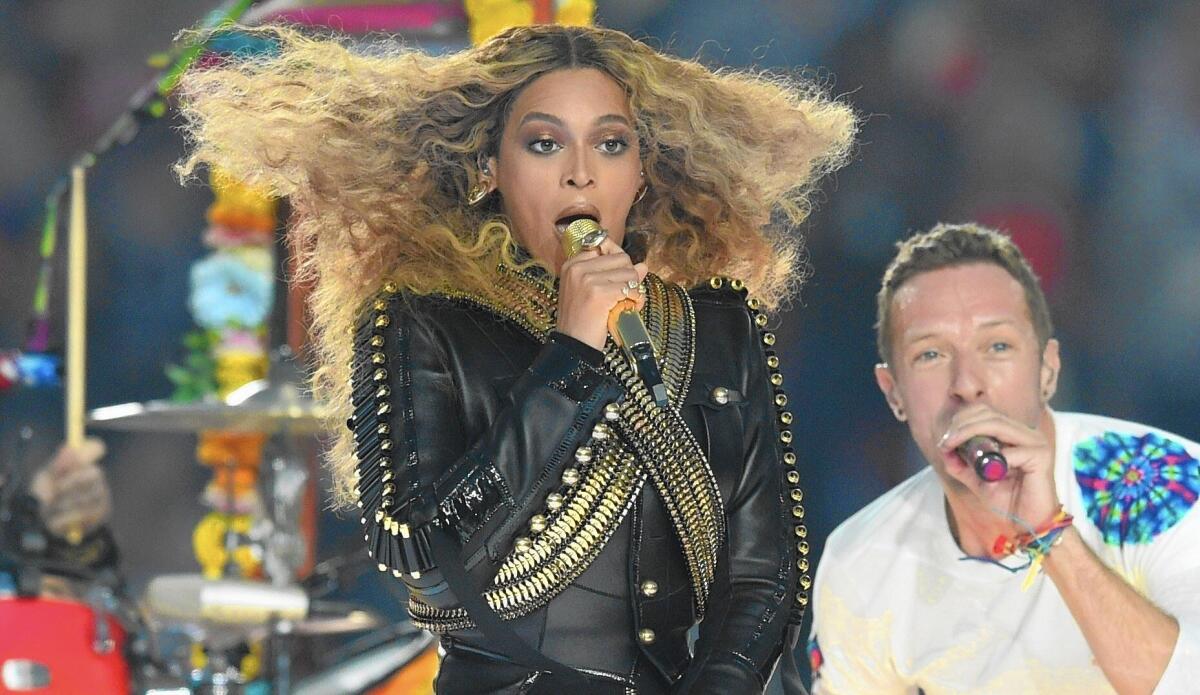Beyoncé bets on a Tidal exclusive to boost ‘Lemonade’ sales

- Share via
As one of the reigning queens of pop, Beyoncé can release her music pretty much any way she wants and still count on big sales.
But the tactics she used with her surprise release of “Lemonade” this weekend can also serve as a playbook for lesser stars looking to maximize sales in an increasingly tough consumer market.
Normally, album release dates are announced long in advance and presaged by a marketing campaign. But Beyoncé harnessed the elements of surprise and social media to build interest — dropping the album while legions of fans were tuning into her HBO special.
“Artists like Beyoncé are used to making a splash, and this is the kind of activity that gives them that response,” said Joe Rapolla, a music professor at Monmouth University and a former record label executive.
Beyoncé then made the album available exclusively for 24 hours on Tidal, giving a boost to the relatively small streaming service owned by her husband, Jay Z, before giving it wider release on iTunes and Amazon.
This maneuver is called windowing — the practice of briefly restricting new albums to certain online outlets before expanding to a wider release. Analysts said the strategy takes a page from the movie business playbook, where some films get an early release in a few major cities before going nationwide.
Adele held her record “25” from Spotify and other sites, resulting in record-breaking sales late last year. In the first week of sales in the U.S., “25” sold 3.4 million copies. Fellow chart-topper Taylor Swift famously pulled her catalog from Spotify in 2014 before the release of her smash hit “1989,” saying that free, ad-supported music devalues her art.
Sales for the late Prince are also getting a massive boost, due in part to the lack of availability of his music on streaming sites. In the three days after his death Thursday, Prince albums sold 579,000 copies, up from 1,400 albums during the previous three days, according to Nielsen Music.
Beyoncé is hardly alone in attempting atypical release methods.
Kanye West put his record “The Life of Pablo” on Tidal in February, vowing that it would never be available through another service — only to have it appear on Spotify and Apple Music in April. And Rihanna granted Tidal a one-week exclusive on her album “Anti.” Not to be outdone, rappers Dr. Dre and Drake have delivered special releases for Apple Music, which launched last year.
The myriad strategies can be perplexing to consumers who are simply trying to find all the music they want in one place.
“It’s confusing, isn’t it?” said Larry Miller, a music business professor at NYU Steinhardt. “For certain mega-star releases, distribution has become atomized.”
And tricky. Artists like Beyoncé must walk a tightrope between promoting their art and annoying fans who may not want to subscribe to a new subscription service.
Beyoncé is a Tidal stakeholder, as are Rihanna and Kanye West. Many fans said on social media that they would join Tidal to hear Beyoncé’s album, but not all were happy about it.
“Seriously guys, if Beyoncé is on iTunes tonight, I’m canceling that Tidal subscription,” wrote Mashable writer Christina Warren on Twitter.
Additionally, analysts said executives and artists may fear that exclusives will encourage piracy if the availability is restricted for too long.
“We’ve never really had good windowing in the music industry,” said Ted Cohen, managing partner at the digital entertainment consulting firm TAG Strategic in Los Angeles. “Shorter is better. If it’s held back for more than a few days, people will acquire it anyway.”
There are other risks to the windowed release strategy. Those who limit access to their music risk angering fans. Last week, a man even filed a lawsuit against Kanye West, saying the rapper had tricked him into subscribing to Tidal by claiming “The Life of Pablo” would be exclusive.
Representatives of Sony and Beyoncé declined to comment.
Tidal, headquartered in Oslo, Norway, has bet on such exclusives to turn around its fortunes after a rocky start in March 2015. It has so far amassed about 3 million subscribers, far behind the 30 million who pay for Spotify and the 11 million who use Apple Music.
Billed as a more artist-friendly streaming outlet, Tidal is also the lone major service of its kind to house Prince’s most popular music. It charges $9.99 a month for basic access and $19.99 for high-quality audio. The company did not say how many times the artist’s music was played in the days after his passing.
More to Read
From the Oscars to the Emmys.
Get the Envelope newsletter for exclusive awards season coverage, behind-the-scenes stories from the Envelope podcast and columnist Glenn Whipp’s must-read analysis.
You may occasionally receive promotional content from the Los Angeles Times.











